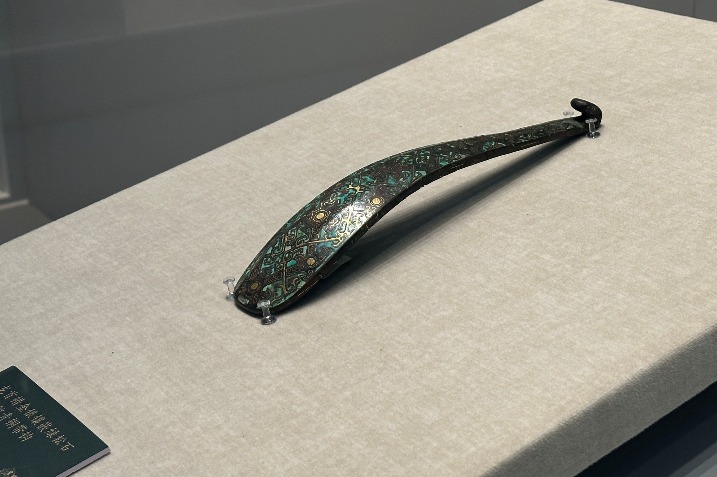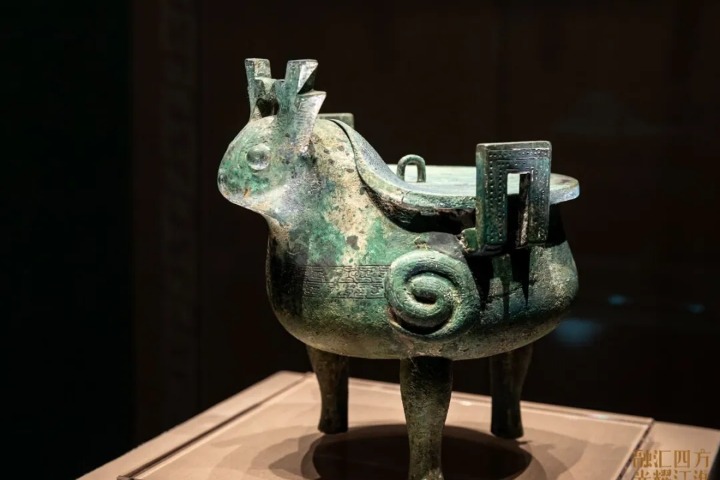Three influential Chinese scientists honored for lifetime achievement

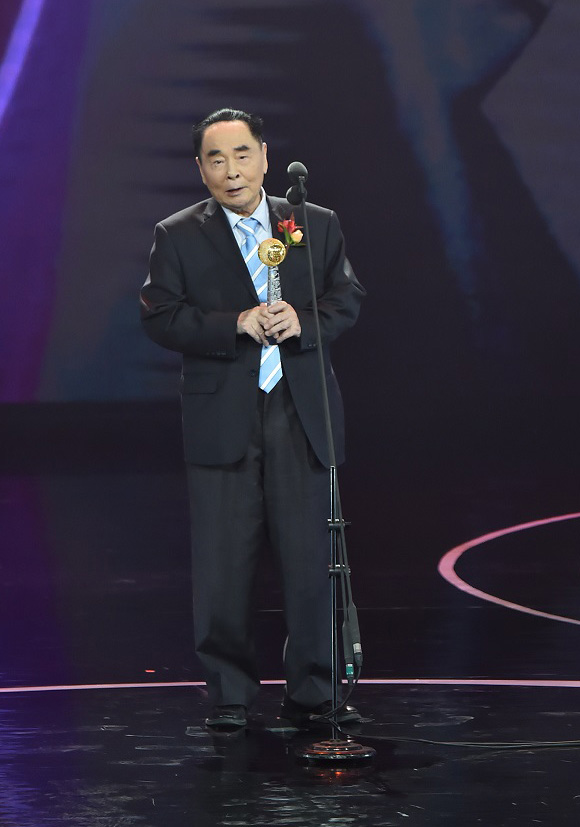
Hou Yunde, one of China's earliest virologists, co-won the lifetime achievement award with top scientists Cheng Kaijia and Huang Xuhua during the annual You Bring Charm to the World event. [Photo provided to China Daily]
Top scientists Hou Yunde, Huang Xuhua and Cheng Kaijia were presented jointly won lifetime achievement awards at a recent annual event to honor the most influential Chinese across the world.
You Bring Charm to the World, an annual awards ceremony co-sponsored by Hong Kong-based Phoenix TV, China News Service and Media Chinese International Ltd, announced the winners at Tsinghua University on March 30.
The awards go to those who have greatly influenced people in and outside China.
Hou, 88, is one of China's earliest virologists. As the first in China to develop human leukocyte interferon, the substance that can contain the spread of the flu virus, he has been on the front line of epidemic control in China for more than six decades.
Upon receiving the award, Hou reiterated that behind China's disease control is a group of devoted scientists, and the honor is also theirs.
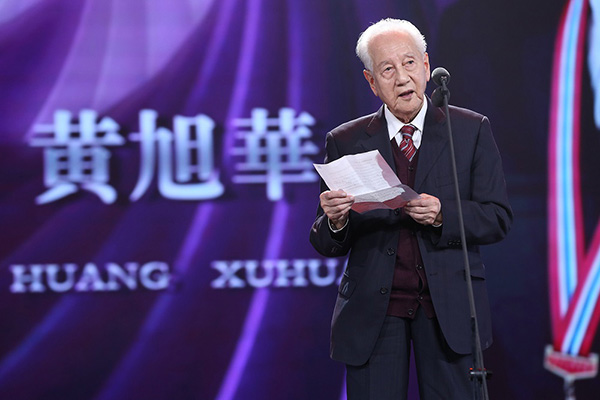
Huang Xuhua, one of the lifetime achievement award winners, spearheads the design of China’s first generation nuclear submarine. [Photo provided to China Daily]
Huang, 92, spearheaded the design of China's first generation nuclear submarine. On Dec 26, 1970, Long March First, China's earliest nuclear submarine prototype, set sail on its maiden voyage. Huang, 44 at the time, set the world record as first chief engineer to be onboard a submarine for its test dive.
Recalling the early days working on the nuclear submarine, where they had to start from scratch and sometimes resort to abacuses to compute complex data, Huang said he is proud to be Chinese and called on the young to contribute to great causes.
"Young people should remember their responsibility, and align their personal pursuits with China's development," he said.
Celebrating his centennial this year, nuclear scientist Cheng was awarded for his work on China's first nuclear bomb. His daughter Cheng Shuyu accepted the lifetime achievement award on his behalf.
Aside from the three, Li Fei-Fei, a top artificial intelligence scientist from Stanford University, took home the event's award to honor most influential figure in the field of science.
The awards have six categories in total. Besides lifetime achievement, the event also honors outstanding individuals in public affairs, art and culture, and competitive sports as well as recognizing emerging young talent.
As the director of the Stanford Artificial Intelligence Lab, Li expressed her gratitude for being a scientist and invited young people worldwide to engage in the study of artificial intelligence.
"I am lucky to be a drop of water in the long-winding river of scientific development that originates from the pursuit of truth and innovation and leads to the wonderland of the unknown," said Li.
Born in Beijing in 1976, Li moved to New Jersey with her family when she was 16. During her early years as an immigrant, she worked at the cash register at Chinese restaurants and cleaned houses to help her family get by, while learning English from scratch and excelling at high school studies.
Graduating in the top 5 percent of her class, Li went to Princeton University on scholarship. While she was in college, she borrowed money to buy a dry cleaning business for her parents, who were still struggling financially. Li attended classes on weekdays and helped at the dry cleaners on the weekends. When she was in graduate school, her mother had cancer and was hit by a stroke.
In the face of daunting difficulties, Li was determined to pursue her dream of obtaining a PhD, for which she turned down offers from Goldman Sachs and McKinsey.
Addressing concerns about artificial intelligence's impact on human lives, Li emphasized that artificial intelligence is a new technology, and the machines' current capability is a far cry from what may have been described in art and literature. However, it is the responsibility of humanity to ponder how technology can change our society.
"Machines don't have their own value system," said Li. "It is human value systems that they represent."
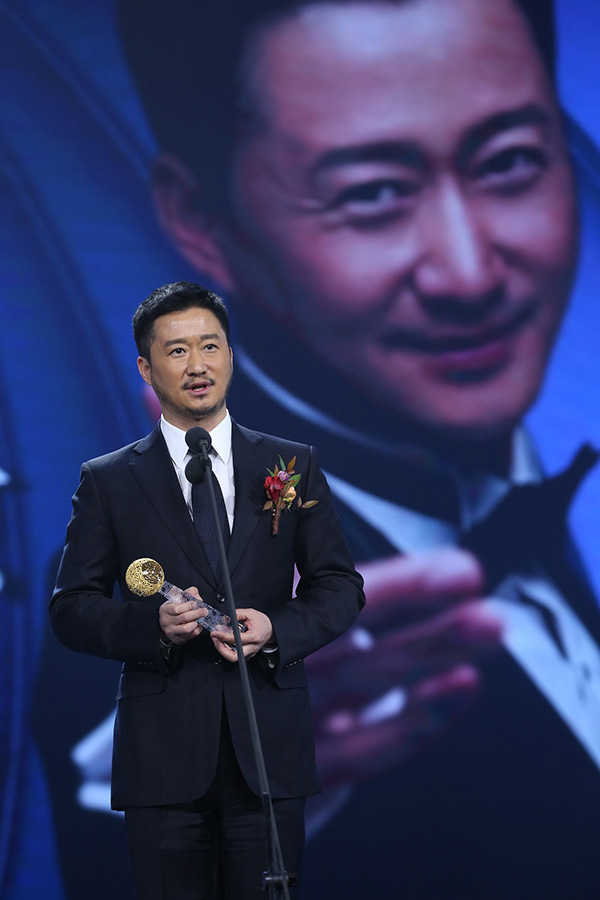
Wu Jing, director of the hit franchise Wolf Warrior, took home the award of You Bring Charm to the World, an annual honor for the most influential Chinese. [Photo provided to China Daily]
In other categories, this year's winners included record-breaking Chinese athletes—three-time Olympic freestyle swimming gold medalist Sun Yang, 2018 Winter Olympics 500-meter short track speedskating gold medalist Wu Dajing and 100-meter dash world champion Su Bingtian. Wu Jing, producer and director of the global megahit action franchise Wolf Warriors, was also among the winners.
In summer 2017, the second installment of the franchise, Wolf Warriors 2, grossed 5.6 billion yuan ($870 million) worldwide at the box office, becoming one of the 100 top-grossing films of all time.
At the award ceremony, Wu thanked Chinese compatriots worldwide for supporting the movie in theaters. The 44-year-old, who was a martial arts practitioner before becoming an actor and director, said he will continue to make movies that appeal to global audiences.
"I'm so grateful for living in an era that rewards those who work hard," said Wu.


